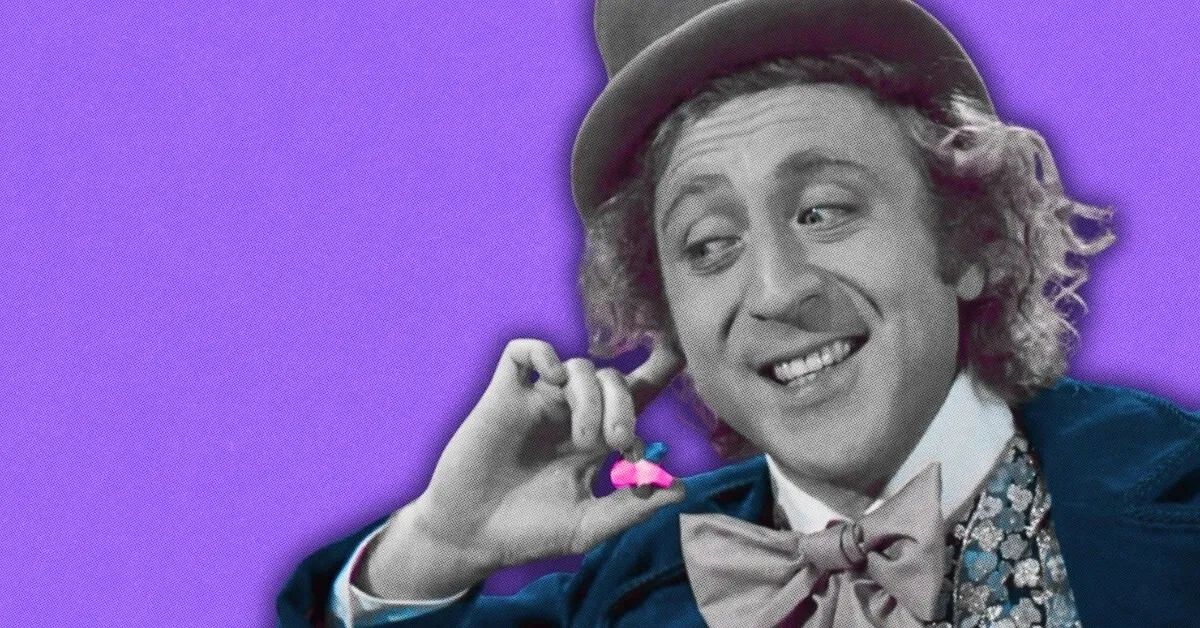In 1964, beloved children’s author Roald Dahl introduced the world to Willy Wonka, an eccentric chocolatier who created out-of-this-world confections with the help of his horde of Oompa Loompas. The franchise now includes three film adaptations, with the most recent hitting theaters this year. The newest addition to the franchise, the Timothée Chalamet-helmed Wonka, casts its titular character in a more whimsical light. The original novel, as well as the first two films, however, paint a decidedly darker picture. So dark that one of the most popular fan theories is that Willy Wonka is a serial killer who targets unruly children.
Though the original novel, Charlie and the Chocolate Factory, and the first two film adaptations of Willy Wonka vary slightly in their presentations of the iconic chocolatier, they share one common thread: the treatment of the disobedient children who visit.
Gluttonous Augustus Gloop is sucked into a pipe after falling into the chocolate river and self-centered Violet Beauregard turns into a blueberry after chewing an experimental stick of gum. Later on, spoiled Veruca Salt and her parents fall down a garbage chute after attempting to capture one of the nut-testing squirrels, and Mike Teevee is shrunk down to the size of a chocolate bar after misusing the Television Chocolate device.
Is Willy Wonka a Serial Killer?
Each time, Willy Wonka gives a warning to the children (albeit half-heartedly so in the Gene Wilder and Johnny Depp adaptations). The badly behaved children – and their parents – disregard these warnings, however, putting themselves in harm’s way in the process.
That said, each of the four disruptive children who tour the chocolate factory with Charlie Bucket makes it out alive. A little worse for wear, sure, but in one piece. So Willy Wonka can’t be a serial killer, right?
Well, it depends on how you interpret the moments leading up to and immediately following the children’s unfortunate accidents.
Keep in mind that when Charlie Bucket found his Golden Ticket, Willy Wonka’s chocolate factory had been closed to the public for years, with no one entering or exiting except for the delivery trucks. The chocolatier is undeniably a recluse wary of human nature, as he chose to shut himself off from the world completely rather than risk his recipes leaking to his competitors.
Then you have Wonka’s apathetic reactions to the fates of the admittedly unsympathetic characters. Despite their young ages, Willy Wonka not only showed no concern for the children’s wellbeing but appeared almost to expect their accidents.
Oompa Loompas: Factory Workers or Homicidal Maniacs?
Perhaps the most incriminating evidence of all is the Oopma Loompas. Each time a child befalls a gruesome fate, the humanoid factory workers appear with a detailed, seemingly pre-rehearsed song and dance about why the child deserved it. Like their leader, the Oompa Loompas appear wholly unfazed by the bizarre, often life-threatening situations.
Take the song accompanying Augustus Gloop’s disappearance up a chocolate pipe. “When he goes through the fudge machine: slowly, the wheels go round and round, the cogs begin to grind and pound; a hundred knives go slice, slice, slice. We add some sugar, cream, and spice; we cook him for a minute more…”
Doesn’t exactly scream “innocent fun,” does it? It sounds more like Augustus is about to become fudge.
Then there’s Willy Wonka’s passing comment when Mike Teevee shrinks to the size of a chocolate bar. “He’s bound to come out of the wash,” Wonka remarks. “They always do.”
This implies that similar incidents aren’t at all an uncommon occurrence at Willy Wonka’s chocolate factory. While these particular children make it out alive, it wouldn’t at all be surprising to learn that their predecessors did not.
So, is Willy Wonka a serial killer? Technically no, each child is the architect of their own destruction. But could Willy Wonka be orchestrating the delivery of his Golden Tickets, placing them in the hands of children he knows will fall victim to temptation once inside the gates of his chocolate factory? We wouldn’t put it past him.


